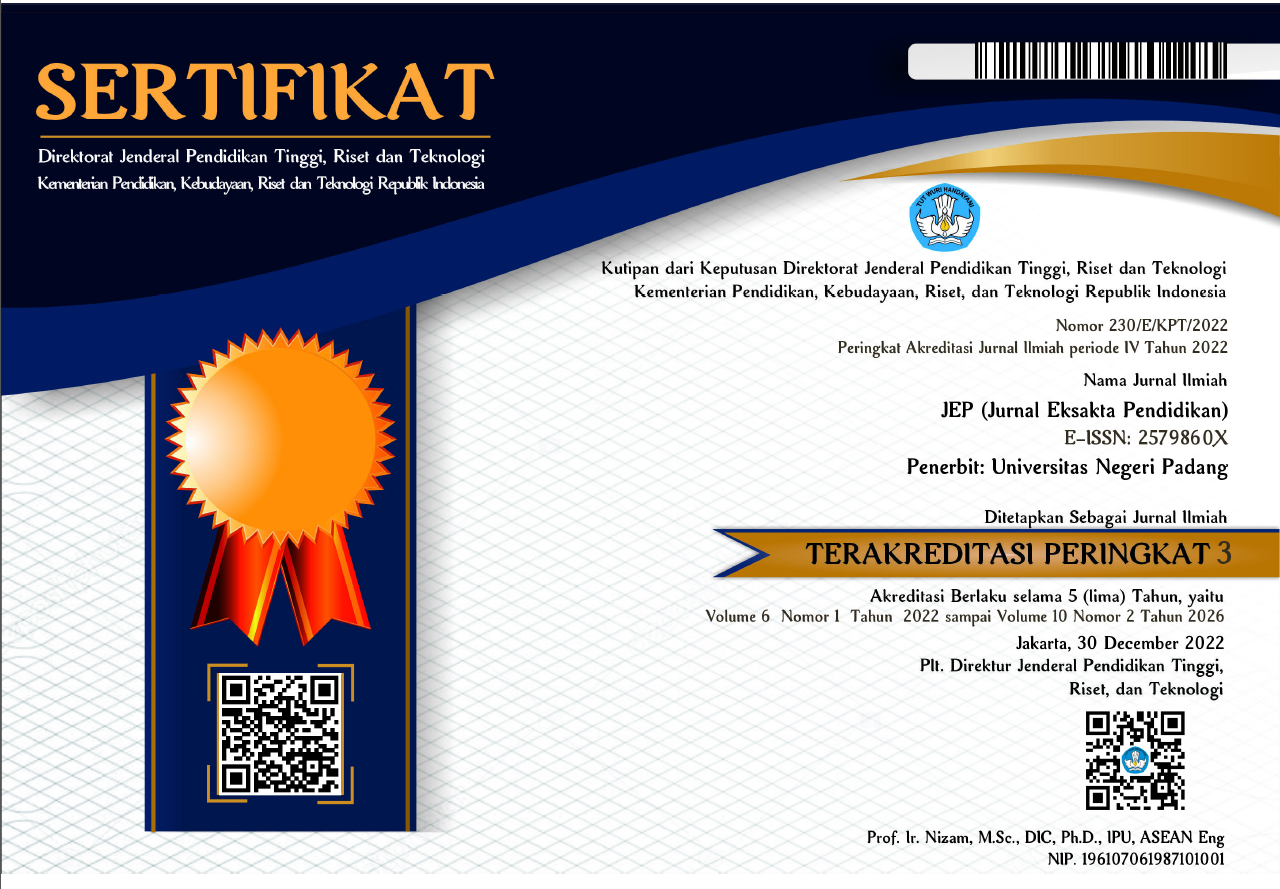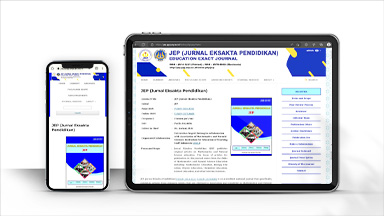The Effectiveness of PBL-Role Playing with the TaRL Approach to Improve Student Learning Outcomes and Activity of Number Counting Operations
Abstract
Learning mathematics is often considered difficult, scary, and abstract for students at the elementary school level. This has an impact on learning outcomes and students' activeness in mastering material concepts. The PBL-Role Playing model with the TaRL approach is one way to overcome this problem. The purpose of the study is to determine the effectiveness of PBL-role playing learning with the TaRL approach in improving learning outcomes and student activity in numerical counting operation material. This research is classroom action research (CAR). The results showed that the learning completeness in the first cycle was 46.43% and the second cycle was 96.43%. Meanwhile, the results of student activity reached an average of 67.85 in the first cycle and 83.92 in the second cycle. Based on these results, it was concluded that PBL-Role Playing with the TaRL approach was proven to be effective in improving learning outcomes and student activity.
Downloads
References
Akdi, O., & Belamhitou, M. (2024). The Teaching at the Right Level approach : A paradigm shift to accelerate Moroccan pupil ’ s learning. 12(September), 238–254. https://doi.org/10.30918/AERJ.123.24.048
Ananda, I.I. Ulfa, J.F., & Yorianda, A. (2024). Teaching at the Right Level (TaRL) as a Potential Solution for Improving Middle School Education: A Systematic Review of the Literature International Journal of Academic Pedagogical Research (IJAPR) Teaching at the Right Level (TaRL) as a Potential Soluti. International Journal of Academic Pedagogical Research, 8(4), 1–12. https://doi.org/10.5281/zenodo.11240915
Ananda, D., & Adi, P. (2024). Implementasi Pembelajaran Berdiferensiasi Dengan Pendekatan Teaching At The Right Level Dalam Pembelajaran Memaknai Informasi Teks Berita Kelas VII SMPN 2 Pakis. Jurnal Pembelajaran, Bimbingan, Dan Pengelolaan Pendidikan, 4(2). https://doi.org/10.17977/um065.v4.i2.2024.8
Armanta, A., Mustaji, M., & Suryaman, S. (2019). the Influence of the Problem Based Learning and Attitudess Towards Learning Outcomes for Mathematics. Edcomtech Jurnal Kajian Teknologi Pendidikan, 4(1), 1–7. https://doi.org/10.17977/um039v4i12019p001
Banerjee, A., Banerji, R., Berry, J., Duflo, E., Kannan, H., Mukherji, S., Shotland, M., & Walton, M. (2021). Title Mainstreaming An Effective Intervention: Evidence From Randomized Evaluations Of “Teaching At The Right Level” In Indi. Angewandte Chemie International Edition, 6(11), 951–952., 22746, 2013–2015.
Chen, J., Kolmos, A., & Du, X. (2021). Forms of implementation and challenges of PBL in engineering education: a review of literature. European Journal of Engineering Education, 46(1), 90–115. https://doi.org/10.1080/03043797.2020.1718615
Dewi, N. K., Untu, Z., & Dimpudus, A. (2020). Analisis Kesulitan Menyelesaikan Soal Matematika Materi Operasi Hitung Bilangan Pecahan Siswa Kelas VII. Primatika : Jurnal Pendidikan Matematika, 9(2), 61–70. https://doi.org/10.30872/primatika.v9i2.217
Dewi, V. C., Kuswanti, N., & Prijono, B. (2023). Implementation of Problem-Based Learning Model based on Differentiated Learning to Improve Science Literacy Skills and Student Activities. Jurnal Eksakta Pendidikan (Jep), 7(2), 225–238. https://doi.org/10.24036/jep/vol7-iss2/772
Evendi, E., & Verawati, N. N. S. P. (2021). Evaluation of Student Learning Outcomes in Problem-Based Learning: Study of Its Implementation and Reflection of Successful Factors. Jurnal Penelitian Pendidikan IPA, 7(SpecialIssue), 69–76. https://doi.org/10.29303/jppipa.v7ispecialissue.1099
Gunawan, A., Guntara, Y., & Saefullah, A. (2024). Development of Mersics.com as an E-diagnostic Assessment with Rasch Model in Prerequisite Material for the Kinematics Chapter. Jurnal Eksakta Pendidikan (Jep), 8(1), 62–72. https://doi.org/10.24036/jep/vol8-iss1/875
Herwina, W. (2021). Optimalisasi Kebutuhan Murid Dan Hasil Belajar Dengan Pembelajaran Berdiferensiasi. Perspektif Ilmu Pendidikan, 35(2), 175–182. https://doi.org/10.21009/pip.352.10
Hosnan, M. (2014). Pendekatan saintifik dan kontekstual dalam pembelajaran abad 21. Bogor Ghalia Indonesia.
Jazuli, L. (2022). TEACHING AT THE RIGHT LEVEL (TaRL) THROUGH THE ALL SMART CHILDREN APPROACH (SAC) IMPROVES STUDENT’S LITERATURE ABILITY. Progres Pendidikan, 3(3), 156–165. https://doi.org/10.29303/prospek.v3i3.269
Johnson, D. W., & Johnson, R. T. (1999). Learning Together and Alone: Cooperative, Competitive, and Individualistic Learning. 6th ed. (6th ed.). Allyn & Bacon.
Joma, M., Al-Abed, S., & Nafi, J. (2016). The Effect of “Role-playing” on Students’ Achievement and Motivation in the Governmental Schools of Bethlehem District in Palestine. British Journal of Education, Society & Behavioural Science, 18(3), 1–25. https://doi.org/10.9734/bjesbs/2016/28782
Kaharuddin, A. (2019). Effect of Problem Based Learning Model on Mathematical Learning Outcomes of 6th Grade Students of Elementary School Accredited B in Kendari City. International Journal of Trends in Mathematics Education Research, 1(2), 43–46. https://doi.org/10.33122/ijtmer.v1i2.14
Khoiro, D. M., Akhwani, Ibrahim, M., & Djazilan, S. (2021). Studi Komparasi Metode Pembelajaran Role Playing dan Demonstrasiterhadap Hasil Belajar IPS di Sekolah Dasar. JURNALBASICEDU, 5(5), 3352–3363.
Komara, E., & Mauludin, A. (2016). Pengembangan Keprofesian Berkelanjutan (PKB) dan Penelitian Tindakan Kelas (PTK). PT. Refika Aditama.
Liu, Y., & Pásztor, A. (2022). Effects of problem-based learning instructional intervention on critical thinking in higher education: A meta-analysis. Thinking Skills and Creativity, 45(May). https://doi.org/10.1016/j.tsc.2022.101069
Mahmuda, A. A., Astuti, M. D., Mikdadi, A. H., Saputra, A. R. M., & Darmadi, D. (2021). Analisis Kesulitan Dalam Pembelajaran Matematika Mengenai Materi Bilangan Bulat Di Kalangan Sd Pada Masa Pandemi. Jurnal Review Pendidikan Dan Pengajaran, 4(1), 90–96. https://doi.org/10.31004/jrpp.v4i1.1827
Marchy, F., Murni, A., Kartini, K., & Muhammad, I. (2022). The Effectiveness of Using Problem-Based Learning (PBL) in Mathematics Problem-Solving Ability for Junior High School Students. AlphaMath : Journal of Mathematics Education, 8(2), 185. https://doi.org/10.30595/alphamath.v8i2.15047
Mardilla, M., Darmiany, D., & Husniati, H. (2021). Hubungan antara Reinforcement Positif dengan Disiplin Belajar Siswa Kelas V Pada Mata Pelajaran Matematika di SDN 19 Rabangodu Utara Kota Bima. Jurnal Ilmiah Profesi Pendidikan, 6(3), 537–545. https://doi.org/10.29303/jipp.v6i3.289
Mustafa, S., Ilmi, N., & Suliati, S. (2024). Innovative Strategies in Math Education: The Impact of PBL and TaRL on Concept Mastery and Classroom Dynamics. Jurnal VARIDIKA, 36(1), 50–63. https://doi.org/10.23917/varidika.v36i1.5150
Nasution, F. R., Adlika, N. M., & Tampubolon, B. (2022). Analisis Perhatian Dan Keterlibatan Siswa Pada Pembelajaran Secara Daring. Jurnal Pendidikan Sosiologi Dan Humaniora, 13(1), 91. https://doi.org/10.26418/j-psh.v13i1.52321
Nasution, N., Medan, U. N., Willem, J., Pasar, I., Sinaga, B., Medan, U. N., Willem, J., & Pasar, I. (2017). Analysis of the Effectiveness of Mathematics Learning Using Role Playing Model on Junior High. 2nd Annual International Seminar on Transformative Education and Educational Leadership, 104(25), 323–325.
Nurhayati, D. I., Yulianti, D., & Mindyarto, B. N. (2019). Bahan Ajar Berbasis Problem Based Learning pada Materi Gerak Lurus untuk. Unnes Physics Education Journal, 8(2), 218. http://journal.unnes.ac.id/sju/index.php/upej%0ABahan
Permana, G. P. (2020). Peningkatan Keaktifan dan Hasil Belajar Matematika Materi Uang Kertas menggunakan Model Role Playing Siswa Kelas II SD Negeri 3 Dermaji Tahun Pelajaran 2020/2021. Educatif Journal of Education Research, 3(2), 53–67. https://doi.org/10.36654/educatif.v3i2.47
Purnomowati, Y. L. (2016). Upaya Meningkatkan Hasil Belajar, Aktivitas Dan Sikap Pada Materi Getaran, Gelombang Dan Bunyi, Melalui Metode Diskusi, Observasi, Dan Eksperimen. Jurnal Pendidikan Fisika, 4(1), 36–48. https://doi.org/10.24127/jpf.v4i1.400
Rambe, S. D. S., Manurung, P., & Syarqawi, A. (2022). Faktor Pendukung Dalam Mengembangkan Keterampilan Komunikasi Siswa Di Smp It Bunayya Padangsidimpuan. Jurnal Ikatan Alumni Bimbingan Konseling Islam, 4(juni), 7–8.
Sekarpuro, S. D. N., & Pakis, K. (2020). MENINGKATKAN HASIL BELAJAR BAHASA INDONESIA DENGAN KECAMATAN PAKIS KABUPATEN MALANG. Buana Pendidikan, 16(30), 133–142.
Smith, K., Maynard, N., Berry, A., Stephenson, T., Spiteri, T., Corrigan, D., Mansfield, J., Ellerton, P., & Smith, T. (2022). Principles of Problem-Based Learning (PBL) in STEM Education: Using Expert Wisdom and Research to Frame Educational Practice. Education Sciences, 12(10). https://doi.org/10.3390/educsci12100728
Stern, J., Jukes, M., Piper, B., Destefano, J., Mejia, J., Dubeck, P., Carrol, B., Jordan, R., Gatuyu, C., Nduku, T., Punjabi, M., Harris, C., Keuren, V., & Tufail, F. (2021). Learning at Scale: Interim Report. October, 247.
Sugiyono. (2014). Metode Penelitian Pendidikan Pendekatan Kuantitatif, Kualitatif, dan R&D. Alfabeta.
Suharyani, Suarti, N. K. A., & Astuti, F. H. (2023). Implementasi Pendekatan Teaching at the Right Level (TaRL) dalam Meningkatkan Kemampuan Literasi Numerasi Anak. Jurnal Teknologi Pendidikan: Jurnal Penelitian Dan Pengembangan Pembelajaran, 8(2), 470–479.
Suswati, U. (2021). Penerapan Problem Based Learning (Pbl) Meningkatkan Hasil Belajar Kimia. TEACHING : Jurnal Inovasi Keguruan Dan Ilmu Pendidikan, 1(3), 127–136. https://doi.org/10.51878/teaching.v1i3.444
Topping, K., Buchs, C., Duran, D., & van Keer, H. (2017). Effective Peer Learning. In Effective Peer Learning. Routledge. https://doi.org/10.4324/9781315695471
Toprak-Yildiz, T. E. (2021). An international comparison using Cognitive Diagnostic Assessment: Fourth graders’ diagnostic profile of reading skills on PIRLS 2016. Studies in Educational Evaluation, 70, 101057. https://doi.org/10.1016/j.stueduc.2021.101057
Wati, M. Y., Maulidia, I. A., Irnawati, & Supeno. (2019). KETERAMPILAN KOMUNIKASI SISWA KELAS VII SMPN 2 JEMBER DALAM PEMBELAJARAN IPA DENGAN MODEL PROBLEM BASED LEARNING PADA MATERI KALOR DAN PERUBAHANNYA. Jurnal Pembelajaran Fisika, 8(4), 275–280.
Wulandari, S. I., Nuryadi, N., & Wargana, M. B. (2023). Efektivitas Metode Pembelajaran Role Playing untuk Meningkatkan Keaktifan Belajar Matematika Siswa SMP Negeri 6 Yogyakarta. Jurnal Pendidikan Tambusai, 7(2), 12142–12147. https://doi.org/10.31004/jptam.v7i2.8320
Yulianto, A., Nopitasari, D., Qolbi, I. P., & Aprilia, R. (2020). Pengaruh Model Role Playing Terhadap Kepercayaan Diri Siswa Pada Pembelajaran Matematika SMP. Jurnal Studi Guru Dan Pembelajaran, 3(1), 97–102. https://doi.org/10.30605/jsgp.3.1.2020.173
Yusnarti, M., & Sutyaningsih, L. (2021). Pengaruh Model Pembelajaran Role Playing Terhadap Hasil Belajar Siswa Sekolah Dasar. JURNALBASICEDU, 2, 253–261.
Zulfa, T., Tursinawati, T., & Darnius, S. (2023). Pengaruh Model Problem Based Learning (PBL) terhadap Hasil Belajar IPA Siswa di Sekolah Dasar. Jurnal Basicedu, 7(4), 2111–2120. https://doi.org/10.31004/basicedu.v7i4.5451
Copyright (c) 2024 Ainur Rofiqi

This work is licensed under a Creative Commons Attribution 4.0 International License.

This work is licensed under a Creative Commons Attribution 4.0 International License.




_(2579-860X).png)
_(2614-1221)1.png)




